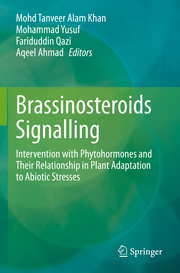Brassinosteroids Signalling von Mohd Tanveer Alam Khan/Mohammad Yusuf/Fariduddin Qazi et al
Brassinosteroids Signalling
Intervention with Phytohormones and Their Relationship in Plant Adaptation to Abiotic Stresses
ISBN/EAN: 9789811657450
Sprache: Englisch
Umfang: xxv, 295 S., 1 s/w Illustr., 295 p. 1 illus.
Einband: kartoniertes Buch
Erschienen am
18.03.2023
Auf Wunschliste
This book presents the state of the skill of understanding brassinosteroids (BRs) signaling plus crosstalk with phytohormone and their association in plant adaptation to abiotic stresses comprising physiological, biochemical, and molecular developments. Due to progressively adverse environmental conditions and scarce natural resources, high-efficient crops have become more important than ever. For the successful improvement of stress-tolerant plants, it is vital to understand the precise signaling appliances that plants practice to abide stresses as well as how much these mechanisms are convinced by phytohormone. However, it is also debatable on which step plants can attain brassinosteroids (BRs) signaling from an evolutionary viewpoint. BRs are involved in modulating a large array of important functions throughout a plant's life cycles. BRs are considered as one of the most important plant steroidal hormones that show a varied role in observing a wide range of developmental practices in plants. Our grip on brassinosteroids signaling has quickly extended over the past two decades, owing in part to the isolation of the constituents intricate in the signal transduction trail. The book proposes a useful guide for plant researchers and graduate students in connected areas.
Mohd Tanveer Alam Khan Dr. Mohd Tanveer Alam Khan is a Leibniz-DAAD Post-doctoral fellow at Leibniz Institute of Plant Genetics and Crop Plant Research (IPK), Gatersleben, Germany. His main focus of research is mainly on understanding the integrative analysis of low-temperature stress defense responses in Arabidopsis thaliana concerning brassinosteroids signaling and metabolite patterns. He completed his BSc, MSc, and Ph.D. from the Department of Botany, Aligarh Muslim University, Aligarh, India. Before joining the Leibniz Institute of Plant Genetics and Crop Plant Research (IPK), Gatersleben, Germany, he has worked as a post-doctoral fellow at the National Key Laboratory of Crop Genetic Improvement, Huazhong Agricultural University, Wuhan, P.R. China. His area of research is to dissect the abiotic stress tolerance mechanism in plants through engineered signaling, proteomics, metabolomics, and biochemical traits in the presence and absence of phytohormones. During the span of eight and half years as a researcher, he has published more than 21 research articles in the Journal of International repute with the total impact factor of more than 70 and 500 citations along with an h-index of 16 and also contributed 2 book chapter to book edition published by Springer. He has been awarded various research fellowships during his Ph.D. and post Ph.D. tenure such as CST-UP-RA, SERB-NPDF, and international PDF in Huazhong Agricultural University, Wuhan, China, and Leibniz Institute of Plant Genetics and Crop Plant Research (IPK), Gatersleben, Germany. Mohammad Yusuf Dr. Mohammad Yusuf is a Lecturer in the Department of Biology, United Arab Emirates University, Al Ain, UAE. Mohammad received his Ph.D. in Plant Physiology and M.Sc. in Botany (Plant Physiology) from Aligarh Muslim University, India. He has worked as the SERB-Young Scientist and also an awardee of the prestigious Dr. D.S. Kothari Postdoctoral Fellowship from the Government of India. He has also been invited to present his work at Huazhong Agricultural University (HAU), Wuhan, China. Mohammad's research contribution includes more than 50 research articles in the international journal of repute and also more than 2500 google scholar citations with 26 h-index. He is exploring phytohormones mediated abiotic stress tolerance mechanism in crop plants through proline metabolism Qazi Fariduddin Qazi Fariduddin is Professor of Botany at Aligarh Muslim University, Aligarh, India where he has been serving as faculty since 2006. He has been extensively working in the field of agricultural biotechnology to explore the abiotic stress tolerance mechanism in plants through physiological and molecular approaches. The findings of his work have revealed that brassinosteroids (BRs) and salicylic acid improved the yield and quality of plants under low temperatures, salt, water, and heavy metal stress and could be exploited as a farmer friendly tool to overcome the menace of crop losses due to various abiotic stresses. Moreover, his findings have also revealed the potential role of hydrogen peroxide and polyamines in conferring tolerance to abiotic stresses in crop plants. His lab is extensively using proteomic approaches to reveal the novel pathway protein expressed under various abiotic stresses in plants. He had Visited Göttingen University, Göttingen, Germany for six months under BOYSCAST Fellowship and conducted experiments related to the topic "Molecular studies of salt tolerance in Arabidopsis thaliana". He has visited Michigan State University, Michigan, the USA on an International Research Project with a specific objective to generate information on "Host target modification as a strategy to counter pathogen hijacking of the jasmonate hormone receptor" (Published in PNAS, 2015). He has published more than 80 research pape






